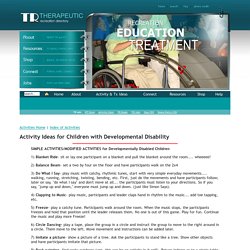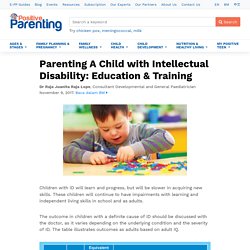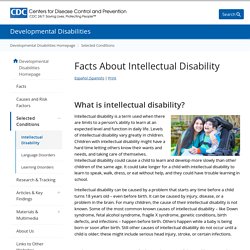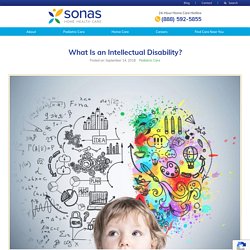

Eligibility Checklist ID. Activities for Individuals with Developmental Disability. SIMPLE ACTIVITIES/MODIFIED ACTIVITIES for Developmentally Disabled Children 1) Blanket Ride- sit or lay one participant on a blanket and pull the blanket around the room.... wheeeee!

2) Balance Beam- set a two by four on the floor and have participants walk on the 2x4 3) Do What I Say- play music with catchy, rhythmic tunes, start with very simple everyday movements.... walking, running, stretching, twisting, bending, etc. First, just do the movements and have participants follow; later on say, "do what I say" and don't move at all... the participants must listen to your directions. So if you say, "jump up and down," everyone must jump up and down. 4) Clapping to Music- play music, participants and leader claps hand in rhythm to the music... add toe tapping, etc. 5) Freeze- play a catchy tune. 6) Circle Dancing- play a tape, place the group in a circle and instruct the group to move to the right around in a circle. 7) Imitate a picture- show a picture of a tree. 17) Back to Nature walks-
Strategies for Teaching Students with Intellectual Disabilities - Therapy Travelers. “My mama always said, ‘Life was like a box of chocolates.

You never know what you’re gonna get.’” Sounds familiar? Yes, that’s the famous line from the award-winning movie, “Forrest Gump.” Is it 23 years ago already when it hit the theaters? Along with remarkable quotes we can still remember to today was Tom Hanks convincing portrayal of the main character. “Stupid is as stupid does.” Forrest is slow-witted and has an IQ of 75. Intellectual disability, formerly labeled “mental retardation,” is defined by the Individuals with Disabilities Education Act (IDEA) as “significantly subaverage general intellectual functioning, existing concurrently [at the same time] with deficits in adaptive behavior and manifested during the developmental period, that adversely affects a child’s educational performance.”
Services for Children with Intellectual Disabilities. Parenting A Child with Intellectual Disability: Education & Training - Positive Parenting. Children with ID will learn and progress, but will be slower in acquiring new skills.

These children will continue to have impairments with learning and independent living skills in school and as adults. The outcome in children with a definite cause of ID should be discussed with the doctor, as it varies depending on the underlying condition and the severity of ID. The table illustrates outcomes as adults based on adult IQ.
Support In School Simply ‘mainstreaming’ a child with ID into a classroom without understanding and addressing their individual needs does not guarantee them a full, equitable and inclusive education. Anxiety and behavioural difficulties will occur if: a child is bored in classthe curriculum is too demandingunrealistic expectations by adultsbullying In a special needs class, children should be given opportunities for inclusion, for example during art, physical education and music. Developing Life Skills Tips to teach life skills Teaching Sexual Health & Awareness. Facts About Intellectual Disability. What is intellectual disability?

Intellectual disability is a term used when there are limits to a person’s ability to learn at an expected level and function in daily life. Levels of intellectual disability vary greatly in children. Children with intellectual disability might have a hard time letting others know their wants and needs, and taking care of themselves. Intellectual disability could cause a child to learn and develop more slowly than other children of the same age. It could take longer for a child with intellectual disability to learn to speak, walk, dress, or eat without help, and they could have trouble learning in school.
Intellectual disability can be caused by a problem that starts any time before a child turns 18 years old – even before birth. What are some of the signs of intellectual disability? Usually, the more severe the degree of intellectual disability, the earlier the signs can be noticed. There are many signs of intellectual disability. What Is an Intellectual Disability? When a loved one is diagnosed with a medical condition, an avalanche of questions rushes through your mind.

What does the diagnosis mean? How do we treat it? How will it affect the patient’s life? What can we do to make it better? While the term “intellectual disability” may sound self-explanatory to some, the reality is that is has many nuances and variations, especially because it stems from a wide array of conditions, such as Cerebral Palsy, Autism Spectrum Disorder, Down Syndrome, or Fragile X Syndrome, Fetal Alcohol Syndrome, genetic conditions, birth defects, or infections. An intellectual disability is characterized by significant limitations in both functioning and adaptive behavior, which covers many everyday social and practical skills. Types of Intellectual Disabilities For some children, it means that they will develop much slower than their peers.